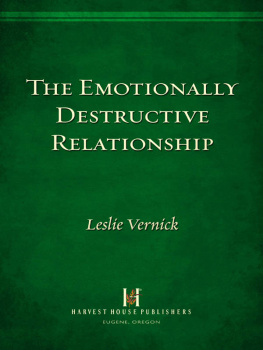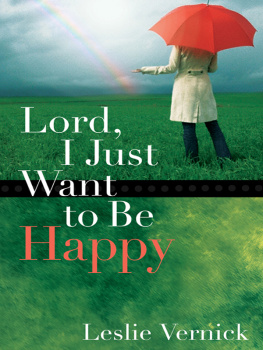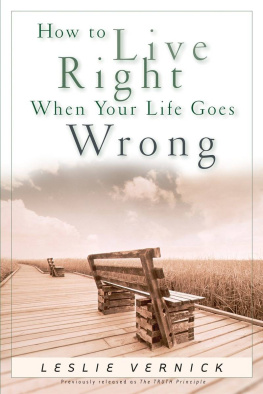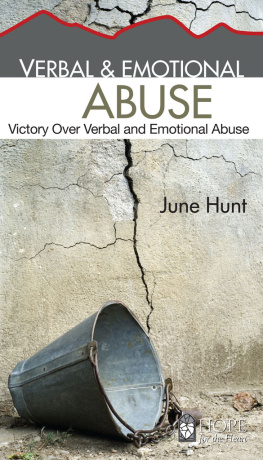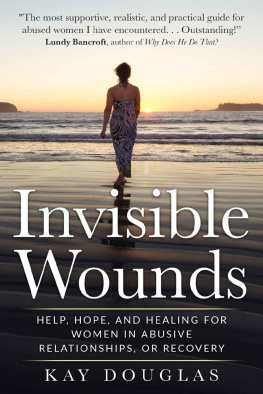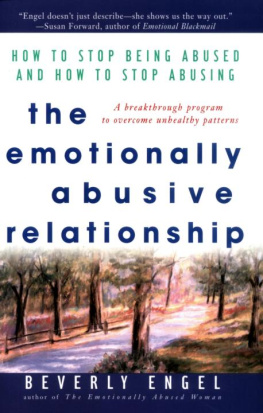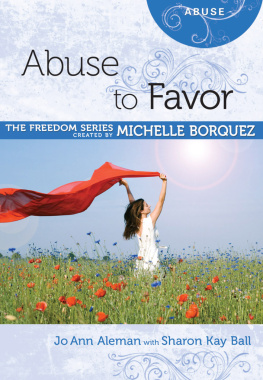
Leslie Vernicks
The Emotionally Destructive Relationship
a book that meets a need
Discover whats wrongfind a biblical understanding of Gods solution. As you apply what you read, you will learn how to let go of destructive ways and will heal and grow to become healthier and changed by Gods loving grace.
Dr. Catherine Hart Weber,
coauthor of Secrets of Eve and Unveiling Depression in
Women; Fuller Theological Seminary adjunct professor
Readers will walk away with a plan of action on how to change themselves and how to change the patterns of their relationships[Fills] a significant need in the world of Christian counseling.
Jeffrey Black, PhD,
psychologist; Chair and Professor of the Masters in
Christian Counseling at Philadelphia Biblical University
I could relate to so many of the people mentioned in this book, and it really scared meI knew I had to make changes in my life and marriageLeslie uses Scripture to validate the points the makes, which is different than any of the other books I have readI would highly recommend this book to anyone who is in or has been in an emotionally destructive relationship. It has changed my outlook on my self and my marriage; I am beginning to feel like myself again.
Jess, a reader
Connects emotional abuse to its spiritual roots and provides practical tools to help victims healChallenges readers to take a united stand against emotional abuse.
Brenda Branson and Paula Silva,
FOCUS Ministries, Inc.; authors of Violence Among Us:
Ministry to Families in Crisis
Provides a critical first step down the path of healing and growth for those who find themselves stuck in abusive relationshipsAs always, Leslie meets the sufferer and the sinner with compassion, truth, concrete direction, and lots of hope.
Winston Smith, MDiv,
director of Counseling Services and faculty member
at Christian Counseling and Educational Foundation
This book is a must-readnot only will it educate the reader to take the necessary steps to freedom, but it will also prevent future destructive relationships.
Michelle Borquez
author of God Crazy: An Adventurous Road Trip to Joyful
Surrender; Host of I-Life televisions Shine
Emotional abuse is often overlooked, butLeslie wonderfully and practically addresses this tough topic that cripples the Body of Christ and our witness to the world.
Karl Benzio, MD,
psychiatrist; founder and Executive
Director of Lighthouse Network
Here is a book I deeply wish didnt need to be written, but also one I am so grateful Leslie Vernick has had the courage to write. You will be moved by her compassion, be appreciative of her candor, and be helped by her professional skills honed in the trenches of real life.
Gene Appel,
Lead Pastor, Willow Creek Community Church,
South Barrington, Illinois
Unless otherwise indicated, all Scripture quotations are taken from the Holy Bible, New Living Translation, copyright 1996, 2005. Used by permission of Tyndale House Publishers, Inc., Wheaton, IL 60189 USA. All rights reserved.
Verses marked NIV are taken from the HOLY BIBLE, NEW INTERNATIONAL VERSION. NIV. Copyright 1973, 1978, 1984 by the International Bible Society. Used by permission of Zondervan. All rights reserved.
All emphasis in Scripture quotations has been added by the author.
Cover by Dugan Design Group, Bloomington, Minnesota
Cover photo Susie Cushner / Graphistock Photography / Veer
ADVISORY
Readers are advised to consult with their physician or other professional practitioner before implementing any suggestions that follow. This book is not intended to take the place of sound professional advice, medical or otherwise. Neither the author nor the publisher assumes any liability for possible adverse consequences as a result of the information contained herein.
THE EMOTIONALLY DESTRUCTIVE RELATIONSHIP
Copyright 2007 by Leslie Vernick
Published by Harvest House Publishers
Eugene, Oregon 97402
www.harvesthousepublishers.com
Library of Congress Cataloging-in-Publication Data
Vernick, Leslie.
The emotionally destructive relationship / Leslie Vernick.
p. cm.
Includes bibliographical references.
ISBN-13: 978-0-7369-1897-8 (pbk.)
ISBN-10: 0-7369-1897-3
1. Interpersonal relationsReligious aspectsChristianity. 2. EmotionsReligious aspectsChristianity. I. Title.
BV4597.52.V47 2007
248.86dc22
2007014155
All rights reserved. No part of this publication may be reproduced, stored in a retrieval system, or transmitted in any form or by any meanselectronic, mechanical, digital, photocopy, recording, or any otherexcept for brief quotations in printed reviews, without the prior permission of the publisher.
Printed in the United States of America
07 08 09 10 11 12 13 14 15 / VP-SK / 12 11 10 9 8 7 6 5 4 3 2 1
To men and women I have met
Those who have trusted God to change them,
have moved beyond being victim or victimizer,
and are becoming who God intended them to be.
CONTENTS

What Is an Emotionally
Destructive Relationship?
The range of what we think and do
is limited by what we fail to notice.
And because we fail to notice
that we fail to notice
there is little we can do
to change
until we notice
how failing to notice
shapes our thoughts and deeds.
DANIEL GOLEMAN

O ne day, unable to contain her pain any longer, Terri blurted to her husband, John, I would rather die than continue to be married to you. Stunned, John could not fathom why Terri felt this way. He believed they had a good marriage. They were both Christians, loved God, and loved each other, or so he thought.
Yet what felt like a good marriage to John felt like death to Terri. For years she tried to be a good wife, meeting Johns needs, loving him as she thought a Christian wife was supposed to love her husband. John loved Terri loving him, and she did it well. John was completely unaware, however, that Terri felt unloved by him.
Throughout their marriage, John was confident, Terri was less sure of herself. Believing that his way was the best way to do things, John embarked upon a mission of helping Terri do things the way he thought she should. At times, John was harsh and gave Terri the impression that her own methods, thoughts, feelings, ideas, and desires were not as wise or as helpful or as spiritual as his.
Sometimes Terri spoke out, but over the years, she found it easier just to keep quiet and go along. She often received affirmation from other Christian women for her quiet and gentle spirit. Eventually, Johns overbearing manner undermined Terris fragile self-esteem and her ability to stand up for her own thoughts and feelings. She began to believe that if she thought or felt differently than John, she was wrong. Over the years, little by little, the person God created Terri to be disappeared.
Johns habitual way of relating to Terri was not intentionally malicious; nevertheless, the damage was real. After Terris blurting incident, they both realized that they each needed to make significant changes (the biblical word is repent) in the way they interacted and thought about each other. Only then could they breathe any health back into their marriage and into Terris fractured sense of self.
Next page
